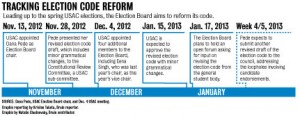
More than one quarter into the school year, promises of undergraduate student government election reform still remain unfulfilled as election officials wait to hear student input from an open forum scheduled for next week.
Members of the Undergraduate Students Association Council Election Board, which oversees the council’s elections in the spring, have said they will work to address loopholes abused in last year’s elections.
Several student groups said they were misrepresented in the endorsement process last year. Supporters of Bruins United submitted student group endorsements in favor of their slate without the student groups’ authorization.
To her knowledge, such loopholes were never sought out before, said Eena Singh, who was last year’s Election Board chair and this year’s vice chair.
“That loophole has been brought to the forefront and it needs to be closed immediately,” she said.
But Election Board leaders want to make sure students have a say before changing the election code, which they said would need to be amended this winter before elections come around next quarter.
“It’s really important (that election reform) does not come single-handedly from the Election Board,” said Dana Pede, a third-year applied mathematics student and Election Board chair. “We don’t want to put forward any sort of policy recommendation changes until we know what the students want.”
The Election Board plans to host an open forum next week to get input from students about changing the election process.
The forum will be the board’s first event this school year to reach out for student input.
So far this academic year, the Election Board has only submitted a draft of the election code with minor grammatical corrections to USAC for approval. The council is expected to approve it at their board meeting next week, Pede said.
Pede said she expects the Election Board to re-group after the forum, write a revised draft of the election code and forward it to USAC for final approval by the fourth or fifth week of winter quarter.
Pede and Singh have not personally reached out to the groups or individuals involved in or affected by the election abuses last year for feedback on revising the code. They said they did not want to seek opinions “behind closed doors” from specific people because of the perceived conflict of interest.
Third-year biology student Alex Pham, president of Circle K, said he had not heard that the Election Board was working to revise the election code since the election abuses occurred.
During elections last year, an endorsement form was signed and submitted in Circle K’s name without Pham’s knowledge, saying Circle K supported the Bruins United slate. Circle K had not planned to endorse any candidates, Pham said.
“Them reaching out to me would be a sign of good faith, like ‘Sorry for what happened this year,’” Pham said. “Whether or not they reach out to me, the important thing is if something would happen about it.” Pham said he would like to go to the forum, but can’t because it will be held the same time as Circle K’s weekly meeting.
Pede was scheduled to meet with Taylor Bazley, a third-year political science student who ran for USAC Financial Supports commissioner and was at the center of a misrepresented endorsement issue last year. But Pede postponed the meeting until after the forum, Bazley said.
During the last election, the Theta Xi fraternity was wrongly listed as endorsing the Bruins United candidate Sahil Seth for Financial Supports commissioner. A Theta Xi representative told a Bruins United supporter the fraternity would support the slate, but would endorse independent candidate Bazley, a member of Theta Xi, instead of Seth. The endorsement however, did not reflect Theta Xi’s wishes despite the communication of their support of Bazley, something the Bruins United liaison to Theta Xi and the Election Board termed a “miscommunication.”
Singh said Election Board officials will discuss the proxy system, which allows student groups to have non-member representatives submit endorsements, at the forum. The system is not mentioned in the election code, but it has become an accepted part of elections throughout the years, Singh said. The board cannot check if the person who submits an endorsement is a group member, she added.
“(The proxy system) existed based on trust and faith in the people representing the groups,” she said. “Because that was pretty much taken advantage of last year, that’s why we will address it at the forum.”
Regardless of what comes out of the forum, Bazley said he is concerned any proposed changes might not be approved by USAC in time if the council has lengthy discussions on them.
“It might take them a little longer than we think,” he said.
Pede, however, said she is not “terribly concerned” that election reform would not happen in time, since the Election Board plans to submit changes to USAC by mid-quarter.
Bazley, who plans to attend the forum, said he was also concerned about the effectiveness of having an open forum, since many students are unfamiliar with the elections.
Pede said the Election Board is doing what it can to represent all students fairly by having the forum in an open, neutral location and focusing on advertising efforts for the forum.
“Having a forum that’s open to all students is something that is in (the Election) Board and everyone’s best interest,” Singh said. “Everybody is welcome to reach out to us to address their concerns.”
Contributing reports by Jillian Beck, Bruin senior staff.
Email Taketa at ktaketa@media.ucla.edu